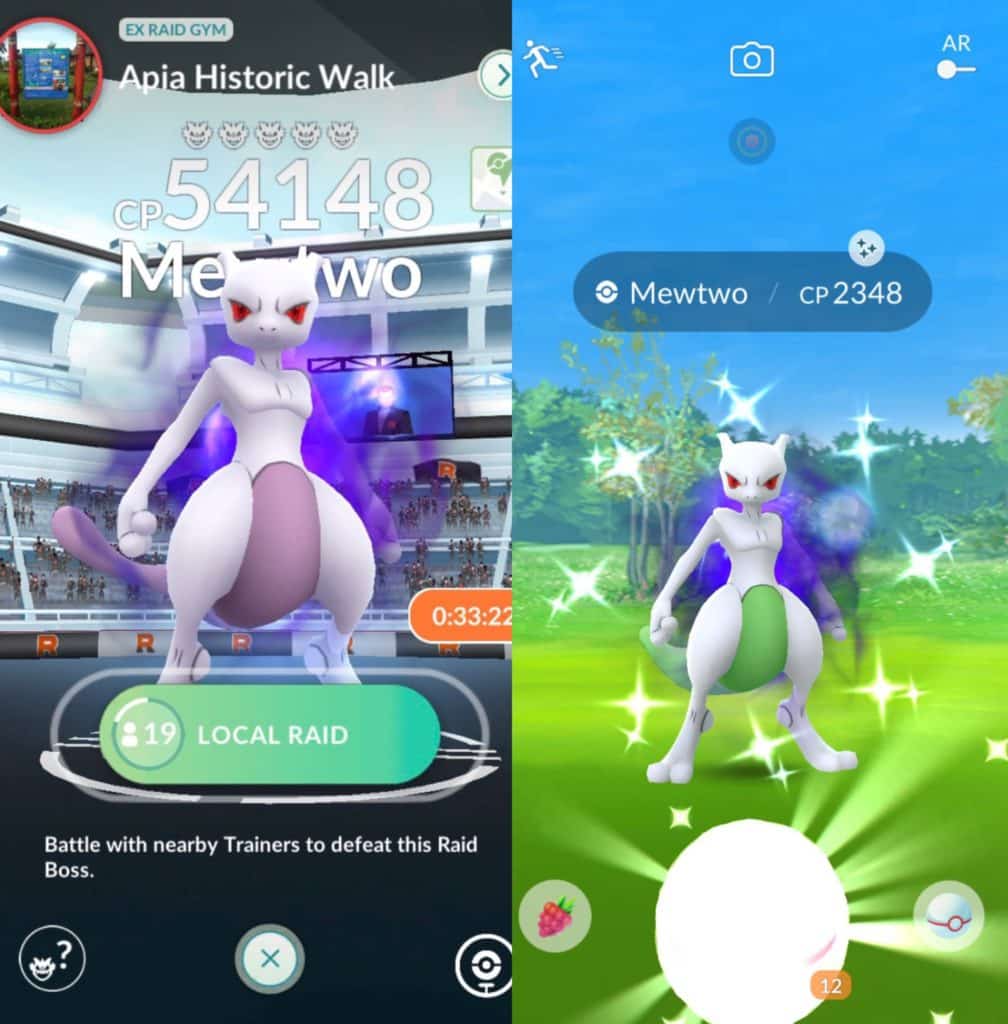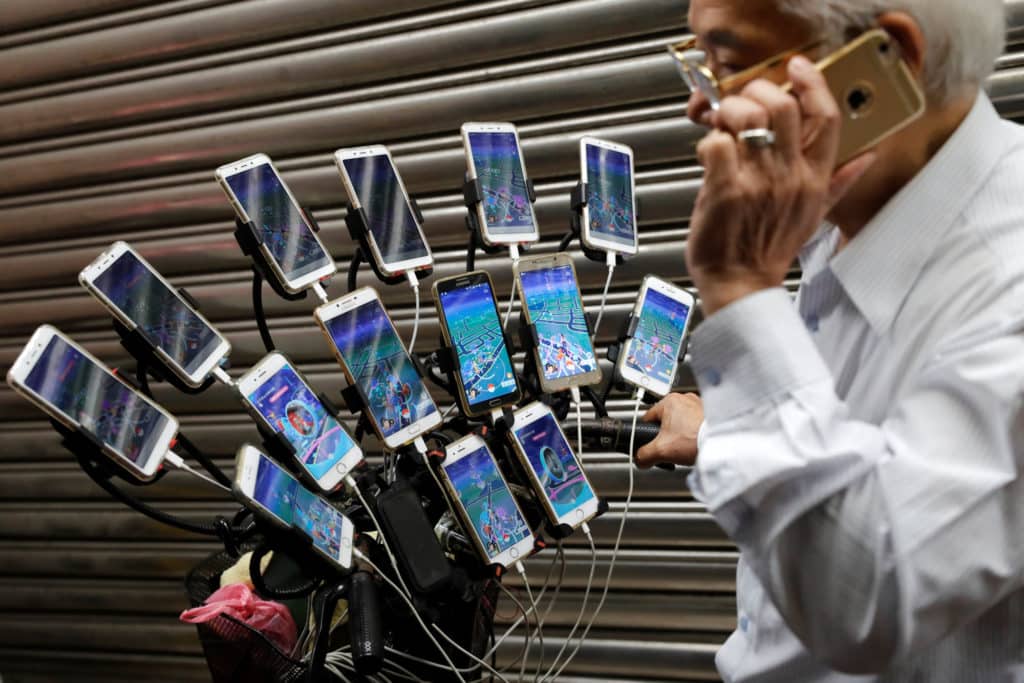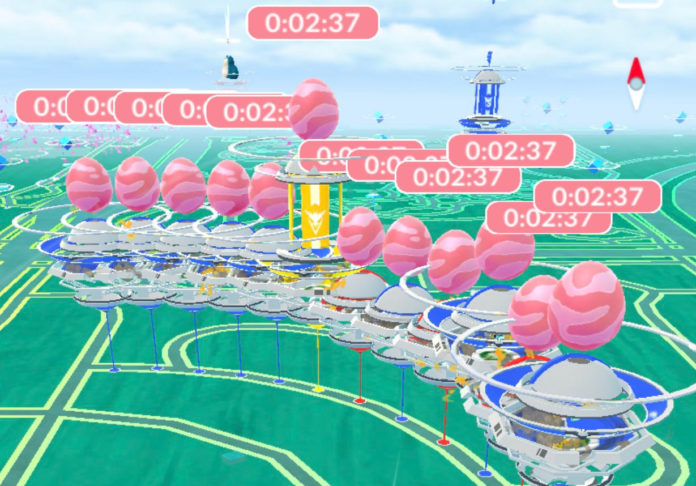A comprehensive guide on organizing and leading a Raid Train in Pokémon GO, including tips on dealing with Trainers who are late, Trainers who play on multiple devices, and all other types of Trainers you can encounter in the wild.
Following a recent weekend of raiding Shadow Mewtwo, and after seeing a Reddit thread pop up reminiscing the challenges of in-person Raid organization, we decided to write this piece to help anyone who ends up in a tricky situation during a Raid event.
We recommend that you share this guide with your local community, and get them to agree with most of the rules.
What’s a Raid Train?
A Raid Train in Pokémon Go is an organized event where a group of players move from one Gym to another in a coordinated manner to participate in as many Raid Battles as possible within a specific time frame.
This strategy allows players to maximize their chances of catching high-level or rare Pokémon that appear in these raids, as well as making it easier to earn raid rewards like Candy XL, XP, Stardust, etc.
This is usually a local community event and can involve either walking, biking, or driving, depending on the distances between Gyms, but it almost always involves cars. Depending on the event, the duration can be from 1 hour to 6+ hours.
Organizers typically plan a route to hit numerous gyms efficiently, and there’s often a group chat for communication during the event. The term “train” is used because the group moves in a line (one after the other) similar to how a train moves along a track.
How to organize a Raid Train?
Organizing a successful Raid Train event in the Pokémon GO community is challenging, mostly due to the time and space logistics required to get everyone in one place on time. However, there are some general tips that will always help you.
We recommend keeping these for any event, regardless if it is a Raid Train or something else, like a Research Day or Community Day event:
- Communication and Coordination: Create a communication channel for the group using apps like Discord, WhatsApp, or Telegram. Make sure everyone who’s participating is included. Ensure all Trainers have push notifications enabled so they won’t miss any important updates.
- Plan the Route: The next thing you need to do is to plan your route. The route should consider several factors such as the proximity of gyms, the frequency of raid spawns, and the traffic conditions. Aim for a route that allows you to hit as many gyms as possible within the shortest amount of time.
- Starting time: Decide on a starting time that works for everyone, or at least the majority of people. Organize your schedule to take advantage of as many spawns as possible. Don’t forget to allocate a few minutes after each Raid for catching the raid boss.
- Set up some Ground Rules: To ensure everyone has a good time and things run smoothly, establish a set of rules. At a bear minimum, you need to decide on how long you will wait for latecomers, what to do if someone’s game crashes, and what to do in cases of 20+ people lobbies. Make sure everyone is aware of the rules before the raid train begins.
- Figure out cars, carpooling and other transportation issues: If the gyms are spread out, consider carpooling to reduce fuel consumption. In any case, you need to consider how people will move from one location to another, park there, and walk to the Gym afterwards
- Prepare Your Counters: Make sure all trainers have their teams set up for maximum effectiveness against the Pokémon being Raided. Share the list of recommended counters and their moves.
As a minimum, you need to sort your route, timing, communication and transportation ahead of the event. This may seem a lot, but it usually boils down to having a discussion in the group chat and figuring it out a day before the event.
If you don’t do this, there is a high likelihood that your Raid Train will split into smaller groups and follow their own path, which is not beneficial to you or the rest of the Raid Train.
In order to prevent that, you have to figure out how you will deal with lazy Trainers, latecomers, and Trainers with multiple devices.
How to deal with lazy or always late players?
Having a couple of folks who are consistently late, or just lazy to move to the next Gym, can be incredibly frustrating for the group. In order to protect yourself as an organizer, and give your group a sense of control over their time, we recommend you do this:
- Establish Clear Rules: Clearly communicate the start time and how long the group will wait for latecomers. It’s not fair for the whole group to wait too long for one or two people. For example, you might say that the group will only wait for an extra 5-10 minutes at each gym.
- Set Meeting Points: Instead of having latecomers catch up to the group at whatever gym they’re currently at, designate specific meeting points along the route where latecomers can join the group.
- Say you are late: Ask people to notify the group if they’re running late or need to join in the middle of the raid train. This way, the group can decide whether to wait or move on to the next gym.
- Expect and understand unexpected Delays: Keep in mind that delays can happen. People might get stuck in traffic, experience technical issues, etc. Try to maintain a sense of patience and understanding. If someone consistently causes delays, it might be worth having a conversation with them about it.
- Have a ‘No Wait’ Rule: If lateness becomes a consistent issue, you may need to implement a “no wait” rule. With this rule, the raid train leaves exactly at the appointed time and does not wait for latecomers. This approach requires clear communication beforehand, but it can help keep the event on schedule.
How to deal with players who rush to the next Gym?

On the flip side, some players will push you to go to the next Gym without catching Pokémon. These are mostly senior players who do not want to spend time catching Raid Bosses which are not shiny, or which are not 100% IVs, or they simply are in for the lols.
Surprisingly, you need to manage these Trainers as much as the ones being late, so this is what we recommend:
- Set Expectations: Make sure all participants understand that there will be a set amount of time granted for catching the Raid Boss after each raid. This ensures everyone knows the plan and there is less frustration. If someone needs to catch the same boss on 3 phones, that is their problem to solve, not the group’s problem.
- Use a Timer: Establish a fair amount of time (like 5 minutes) for everyone to try and catch the Raid Boss. Start a timer after the boss is defeated and once the time is up, everyone should be ready to move onto the next raid. This just makes sense for everyone.
- Encourage team spirit: Remind people that Raid trains are about cooperation and having fun, not just the raids themselves. Ask everyone to respect the needs of their fellow Trainers.
- Create Separate Groups: If your community is large enough, you might consider creating separate groups or sub-groups based on play styles. If some people want to rush and others prefer to take their time, having separate groups could make the event more enjoyable for everyone.
How to deal with players with multiple devices?

And of course, you always have a number of players with 2, 3, or even 4+ phones that will join your Raid Train. No matter what Niantic outlines in their Player Guidelines, there will always be players who like playing with multiple accounts for the increased grind, and the reduction in Raid difficulty that it brings.
We recommend talking through the topic as well:
- Set Clear Guidelines: Just like with all the other aspects of your raid train, clear communication is key. Ensure your group guidelines cover how you’ll handle game crashes, and specifically address multi-device play. For instance, you might establish a rule that the group will only wait a certain amount of time for reboots/relogs.
- Quick Restart: If a player’s game crashes, they should know how to quickly force quit the app and restart it. This can save valuable time compared to waiting for the game to recover on its own.
- Individual Decision: If a player’s game on one device crashes, they should decide whether to wait for the game to restart or continue playing on their other device. The group can then move on, keeping to the schedule.
- Prepare your devices: Ask players to make sure their devices are in good working condition before the raid train. This includes ensuring devices are fully charged, have enough memory for smooth gameplay, and the latest version of the game is installed. A good WiFi/mobile data connection is also essential.
- Limit the Number of Devices: To keep things fair and prevent unnecessary delays, you might consider implementing a rule limiting the number of devices per player during the raid train. This is something you’d need to discuss with your community to see if it’s a reasonable and acceptable restriction.
Parting words
Organizing a Raid Train can be stressful, but it is often worth the hassle, especially if the Pokémon being raided is something like Shadow Mewtwo, or a particularly rare Raid Boss.
Be persistent with enforcing the rules, think through all of the social situations that you will be in, and arm yourself with patience. Remember that this is a game, and that it should be fun to play, so don’t be too strict on yourself if your Raid Train doesn’t work out on the first try.
Stay safe, and see you out there!



